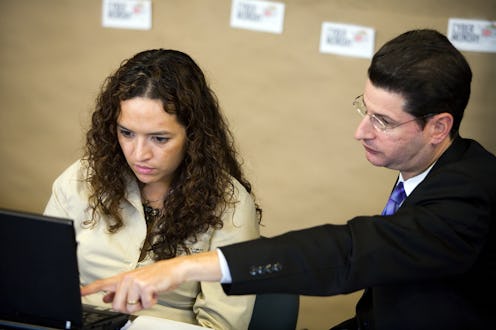News
Wage Gap Is Different For Young Women
First, the bad news: Young women remain jaded about their future prospects in the workplace. In fact, 75 percent of 18-to-32-year-olds think companies need to work toward more gender equality. According to a new Pew Research Center survey of about 2,000 people, 60 percent of Millennial women think that being a working parent makes it more difficult to advance in a job or career, compared to only 19 percent of the demographic's men. In fact, "[young] women remain as pessimistic as their mothers and grandmothers regarding gender equality in the workplace," according to the Associated Press. Yikes.
"This report shows that we are still very much in a 'stalled revolution' when it comes to gender equality in the workplace — and young women see it," said Pamela Smock, a sociology professor at the University of Michigan. "When we see our male CEOs taking off a day to care for a sick child, then we will be working in a more gender-equal workplace — and a more gender-equal world."
Now, for the better news: Millennial women make 93 percent of what men do — a much narrower disparity than the atrocious wage gap that still exists for women as a whole. Factoring in all ages, women still make an average of 77 cents for every dollar earned by men. So why the difference? Well, the wage gap is likely narrower for young women because they have not had children yet. (A factor often blamed for unequal pay.)
In the age of supposed "leaning in" and "having it all," women are still stymied by the motherhood-or-career conundrum. This new Pew research shows that the gender pay gap will widen for women by their mid-30s — right about the time many start getting married and having children. The report also shows that many women do not actively push for promotions or wage increases, because it's more important for them to have job security and flexibility at that time of their lives.
The new Pew survey had some other interesting findings as well: only 15 percent of young women say they've faced gender discrimination at their jobs. Women have also made leaps and bounds in terms of education. Nearly 40 percent of females ages 25-32 earned bachelor's degrees, while only 31 percent of men in the same age bracket have done so. Gains in education have translated to higher salaries. In 2012, the overall median hourly wage for women was $14.90 versus men's $17.79, while the wage gap was $11.94 for women and $18.57 in 1980 (with those calculations based on 2012 dollars). In fact, hourly pay rates have actually decreased by 20 percent for young men from 1980-2012.
But the survey found that while 24 percent of young men are not interested in becoming a manager, 34 percent of women wouldn't want a "Best Boss Ever" mug.
Even though men and women hold a nearly equal amount of managerial and administrative occupations, only about 4.5 percent of Fortune 1000 CEO positions are held by women. Just yesterday, women saw a big gain with the announcement that Mary Barra was appointed as General Motors' first female CEO. Can you imagine such a thing happening when your grandpa was still driving his Cadillac around town?
Keep it moving forward, ladies.
Images: Bureau of IIP, Rebloggy, Fisher Price
